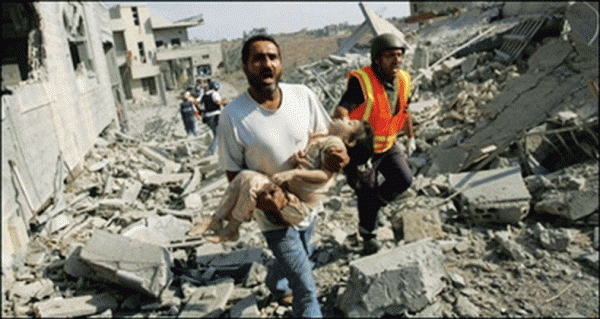April - Lebanon Israel’s Wars on Lebanon: Operation Grapes of Wrath
Beginning
Israeli hostilities against Lebanon began on April 11, 1996 under the pretext of retaliation against the operations that had targeted Israel, more precisely Hezbollah’s shelling of northern Israel, which injured six Israelis on April 9. Hezbollah’s rocket attack came in response to the death of a number of Lebanese in the town of Braashit hit by Israeli rockets.
However, Israel’s ulterior motive was to dwarf or end the armed presence of Hezbollah in South Lebanon and to prevent it from firing rockets against Israel.
Military action
Israel did not advance into the liberated Lebanese territory beyond the Blue Line, which was under its control, limiting its attack to air raids against Hezbollah’s military strongholds and other civilian targets, which it raided with the intent of pitting residents against Hezbollah and displacing them from the South. Moreover, it laid siege to the Lebanese ports so as to prevent the delivery of weapons to Hezbollah. Israel’s attack was not limited to South Lebanon, as Israeli aircrafts shelled several civilian targets, foremost of which were the power stations in the Al-Jomhour area near Beirut.
Hezbollah did target northern Israel with missiles but was not able to realize the so-called balance of terror against Israel.
Damages
The damage arising from the war broke down as follows:
Displacement of 150,000 to 200,000 Lebanese from South Lebanon.
Death of 170 Lebanese most of whom died during the air raid conducted against a UN headquarters thought to be safe in the town of Qana.
Injury of 350 Lebanese.
Destruction of or damage to over 2500 residential units.
End of the War
Cease-fire was announced on April 27 signaling the end of the war after both parties reached an agreement known as the April Ceasefire Understanding.
April Understanding
The United States understands that after discussions with the governments of Israel and Lebanon and consultations with Syria, Lebanon and Israel will ensure the following:
- Armed groups in Lebanon will not carry out attacks by Katyusha rockets or by any kind of weapon into Israel.
- Israel and those cooperating with it will not fire any kind of weapon at civilians or civilian targets in Lebanon.
- A Monitoring Group will be established for the purpose of overseeing the implementation of the understanding stated above.
- It is recognized that the understanding to bring the current crisis between Lebanon and Israel to an end cannot substitute for a permanent solution. Toward this end, the United States proposes the resumption of negotiations between Syria and Israel and between Lebanon and Israel at a time to be agreed upon, with the objective of reaching comprehensive peace.
- The developments that unfolded afterwards proved that the understanding was nothing other than a mere truce as Israel resumed a massive attack on Lebanon in July 2006, which ended with Resolution 1701.








Leave A Comment